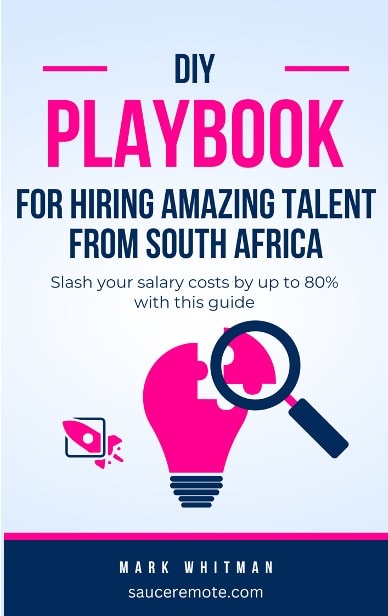Thinking of adding Spanish talent to your team? ¡Olé!
Spain is a hub of skilled professionals in technology, tourism, and engineering.
With a diverse economy and a passion for innovation, it's an ideal spot for businesses looking for top talent.
Companies like Amazon and Siemens have successfully hired employees in Spain, taking advantage of the country's skilled workforce and strategic location.
But, much like navigating tapas menus, Spanish labour laws can be tricky.
That's where an Employer of Record (EOR) in Spain comes in. They streamline the hiring process, ensure compliance with local regulations, and take the headache out of paperwork.
Let me explain how partnering with an EOR in Spain can help your business grow smoothly.
Ready? Let’s roll.

Discover how to slash your salary costs by 80%
Get our exact process for hiring amazing overseas talent from South Africa. Includes copy-and-paste templates and a detailed salary guide.
What Is an Employer of Record in Spain?
An Employer of Record in Spain is a third-party organisation that takes care of all the legal responsibilities linked to employment for your local team.
From payroll and tax compliance to managing contracts and ensuring adherence to Spanish labour laws — they've got it all covered.
In other words, the EOR becomes your team's legal employer in Spain, while you stay focused on guiding their day-to-day work.
My pro tip: If you're curious about the general concept of EORs, look at my detailed guide on "What Does EOR Stand For?" for a deeper dive.
Why Do Businesses Choose an EOR in Spain Over Hiring Directly?
Here are some of the key reasons why partnering with an EOR in Spain is a smart move:
- Quick Market Entry: Forget about the lengthy process of establishing a local entity, which can often take several months or even up to a year. With an EOR, you can start operations in just a few weeks, making market entry significantly faster.
- Compliance Expertise: Spanish labour law has its nuances, but an EOR helps you navigate it with ease.
- Cost Efficiency: Skip the costs associated with opening a physical office and maintaining a legal entity in Spain.
An EOR connects you with Spain's deep talent pool while sidestepping bureaucratic headaches.
But what exactly makes Spain such an attractive hiring market?
Let’s break it down.
Hire remote talent from South Africa & slash salary costs by 80%
Salaries start from £8,000 per year!
Understanding the Spanish Employment Landscape
When I first looked into hiring in Spain, I realised that its employment landscape had interesting quirks.
Spain is pro-business but has protective labour regulations that you must navigate.
Here’s what you need to know about hiring in Spain:
Standard Working Hours and Overtime
In Spain, the typical workweek is 40 hours, usually split across five days.
Spain also takes work-life balance seriously — siesta culture might not be as common as before, but flexibility is still the name of the game.
For example, many companies in Spain, such as Telefónica, have adopted hybrid work models, allowing employees to work remotely several days a week, which has been well-received and boosts productivity.
Overtime pay can vary but is generally compensated at a higher rate or can be substituted with time off.
Non-compliance can lead to penalties, so it’s essential to be on the ball with these details.
Compensation and Currency
Spain uses the Euro (EUR), and wages vary depending on the region and industry.
For instance, wages tend to be higher in regions like Madrid and Catalonia, while they can be lower in areas such as Extremadura and Andalusia.
The country’s minimum wage is set at EUR 1,080 per month (2024), but salaries can be quite competitive, particularly in sectors like tech and engineering.
Many Spanish employers also provide additional benefits, such as meal vouchers or transportation allowances, which contribute to a more attractive work environment.
Hire remote talent from South Africa & slash salary costs by 80%
Salaries start from £8,000 per year!
Public Holidays and Vacation Leave
Spain celebrates numerous public holidays, which can differ by region. Some key ones include:
- New Year’s Day (January 1)
- National Day (October 12)
- Christmas Day (December 25)
These regional differences in holidays can impact planning for companies with employees in multiple areas, requiring careful coordination to ensure business continuity.
Full-time employees are entitled to at least 22 working days of paid annual leave and, depending on the region, 12 to 14 public holidays.
Taxes and Social Contributions
Understanding the tax system is crucial to staying compliant in Spain. Here’s what you must know when hiring Spanish employees.
Income Tax
Employees pay income tax on a progressive scale, ranging from 19% to 47%, depending on their income. Employers are responsible for withholding taxes from salaries.
Social Security Contributions
Employers must contribute around 30% of an employee's salary to Spain's social security system, covering healthcare, pensions, and unemployment benefits.
Hire remote talent from South Africa & slash salary costs by 80%
Salaries start from £8,000 per year!
Leave Policies and Parental Benefits
Employees in Spain are entitled to paid sick leave, with compensation depending on the duration and nature of the illness.
Spain also provides 16 weeks of paid maternity leave, and fathers are entitled to 16 weeks of paid paternity leave, ensuring a family-friendly environment.
Probation Period and Termination
Probation periods in Spain usually range from 2 to 6 months, depending on the contract type.
The notice period for termination varies based on the employee's tenure and role, usually ranging from 15 days to 3 months.
Employers must comply with Spain’s Workers’ Statute, which ensures fair treatment and protections for both parties in the employment relationship.
Now that we understand Spain's labour market, how do we choose an employer of record in Spain?
Easy. Let me show you how.
Hire remote talent from South Africa & slash salary costs by 80%
Salaries start from £8,000 per year!
Choosing the Right EOR in Spain
Picking the right Employer of Record in Spain is crucial for success. But how do you choose the best EOR in Spain?
Easy. You look for an EOR in Spain with the following:
- Local Expertise: Make sure your EOR knows Spanish labour law like the back of their hand.
- Strong Local Network: Ensure your EOR has a robust local network, which can be crucial for navigating bureaucratic challenges.
- Comprehensive Services: They should handle everything from HR to payroll, compliance, and employee benefits.
- Transparent Pricing: Clear and straightforward fee structures are a must.
- Proven Track Record: Look for testimonials and case studies of businesses that have expanded into Spain successfully.
And if all of this seems a bit overwhelming, don’t worry — there’s always more help available.
Look Beyond Spain's Labour Market
While Spain is a fantastic choice, other countries also offer exciting opportunities.
Markets like the Netherlands, Italy, and even South Africa provide access to highly skilled workforces, each with unique advantages.
South Africa has a rapidly growing tech sector, and an employer of record in South Africa can help you access this large pool of multilingual professionals.
The right EOR can help you explore and navigate any of these labour markets.
Hire remote talent from South Africa & slash salary costs by 80%
Salaries start from £8,000 per year!
My Final Thoughts
And there you have it: Hiring in Spain doesn’t have to be daunting.
With the right employer of record in Spain, you can tap into top talent while leaving the complexities of compliance and payroll to the experts.
Let your EOR take care of the red tape, so you can stay focused on what truly matters — growing your business.
